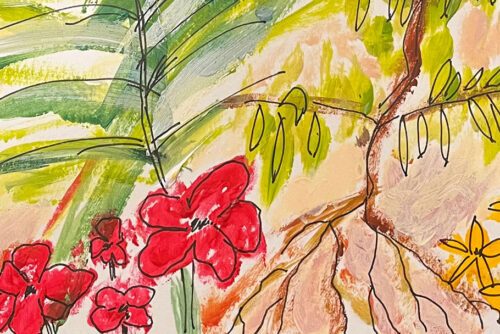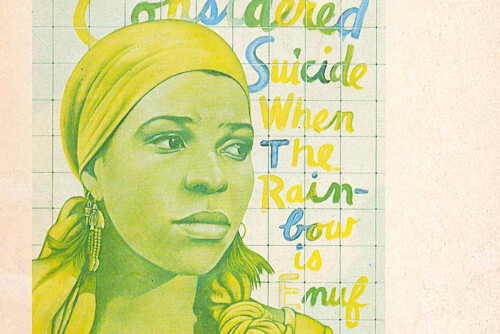Preface
by huiyin zhou
These five poems are part of a translation series that emerged from 离离草 Chinese Artists and Organizers (CAO) Collective’s poetry writing workshops in 2022 with a group of diasporic Chinese queer feminists. The poems were originally written in Chinese using exquisite corpse, a collaborative art game attributed to French surrealists Yves Tanguy, Jacques Prévert, André Breton and Marcel Duchamp in 1920s Paris. 1 We are also inspired by similar collaborative and experimental writing traditions in Chinese literature, such as 蕉园诗社, the first women’s poetry society during the Qing dynasty. Workshop participants produced collective poetic narratives translated into English by 离离草 CAO Collective members huiyin zhou and fran yu.
离离草 CAO Collective’s practice is rooted in a feminist ethics of care. Collaborative writing and translation engages the affective experiences of diasporic Chinese queer feminists and helps rebuild the community’s lifeworlds that traverse national, geographic, and generational boundaries. These poems are an invitation into moments of improvisation, play, collective memory, and collective feeling. They are also invitations into transformation as community members bring the poems into protests, marches, chants, and performances, such as CAO Collective’s own Ciba Punch 女拳手打糍粑.
This series of five poems, curated by huiyin zhou, speaks to different aspects of the affective lives of a movement. There are intimate conversations with aunties and grandmothers; fond memories and longings for reconnection; rage and agony in witnessing and participating in China’s social movements from the margins of diaspora; and collective dreaming of survival and making home together.
As Sara Ihmoud and Shanya Cordis write, “[B]earing witness to war from the space of diaspora is punctuated by the disruption of ghostly encounters.” 2 In the same breath, these poems hold the spirits of mothers and daughters trapped in lockdowns, queer feminist protestors arrested for mourning, and our own struggles of language-ing in the uneven geopolitical terrains of exile. In an attempt to express what seems elusive, these poems wrestle with visions of freedom borne from our interconnected bodies. In calling and responding to each other’s offerings, the poems enact a community-based liberatory praxis, language-ing in our own affective voices to sustain us through and beyond an apocalypse.
*
每一条街上的风
我们的话语和回忆千疮百孔
你站在那边,我站在这边
中间飘着我们的线头
够不到,抓不住
路人走过,对我们熟视无睹
习惯了沉默,张口发现声音
已经生锈,线头烧起来
灰烬是泪水的咸
我用闭合干涩的嗓子大喊
把所有核酸棉签都吐出去
棉花糖好吃吗?
这里是你似曾相识的幽灵故乡
侧头看看,身旁的伙伴目光流淌
原来 原来
呼吸仍在你我的胸膛
咳出血丝了吗?
ta予你久别重逢的铁锈色拥抱
抬头望望,新月邀请你微笑许愿
没事 没事
愿望还在夏夜的那个田埂
在月光下 滚圆的像个熟透了的西瓜
黄色的瓤子
和小麦的金边互相映照
还记得ta的脸吗?
曾经是你最亲的人,或者素昧平生
踏出凶险旅途的第一步便倒下的
悄无声息的
谢谢你踏出那一步
我的脚掌和你的脚印贴合
虽然不能完全相印
踩在你用全身的力气按压出的那个印记里
我蹬了出去
我踩碎一切他们眼里必要的
我都不要
那些为虎作的伥
我们一步一步拆解掉
再把那些碎片做成风筝
放飞 嬉笑
追逐他们不让我们触摸的风
变成风
我是否在哪里见过你?
我和你不大相熟
又同你共享一颗心脏
还有同一具身体
任由风呼啸
我们的泪都在流淌
请牵住我的手
请牵住我的手
对了 我们的手曾经连结山与海与每一条街
The winds on every street
Our words and memories are pleated with a thousand wounds
with you standing over there, me standing over here
the threads between us drifting around
can’t reach them, can’t catch them
people pass by and pretend they don’t see us.
Being used to silence, I open my mouth and realize
my voice has rusted, the threads have caught fire
burnt into dust, salted with tears.
I scream with my choked, hoarse throat.
I spit out all the PCR cotton swabs.
Does cotton candy taste good?
This is the ghost country of your once familiar home.
Look around, your friends rise to your eyes like tides;
after all, after all —
we are still breathing.
Have you coughed up blood?
They give you a rusty hug to celebrate this long-awaited reunion
lift your head up, see the new moon inviting you to make a wish.
It’s okay, it’s okay
our wishes are still sleeping on the ridges of the field
under the moonlight, plump like ripe watermelons
yellow flesh mirroring
with the wheat’s golden braids.
Do you still remember their face?
a once close friend, or someone you’ve never met
they fell at their first step on a perilous road
without a sound.
Thank you for the step you took
so my feet can map onto yours
even though they can’t fully match.
Stepping into the print that carries the utter weight of your body
I kick off my departure
I stomp over everything they deem as necessary
I don’t want any of it.
The ghostly claws they have made for the paper tiger
we will dismantle them rip by rip
and make kites out of their shreds
we will fly them high, we will play, we will laugh
chasing the winds they don’t let us touch
until we become winds ourselves.
Have I seen you somewhere?
I am not familiar with you
but we share one heart
and the same body.
Let the winds howl
they can’t break the flows of our tears.
Please hold my hand,
please hold my hand.
You see, our hands once joined all mountains and seas
and every street.
*
表姨,
你也和我一样后悔来到这个世界吗?可是如果在这个世上有谁我衷心地希望她可以快乐,一定是你。就像你对我的期望一般。
表姨,你也和我一样想要丢掉名字里的包袱吗?妈妈说,你的小名 “两双”,寓意是两双女儿后是时候会有儿子了。
“表姨”,不如让我们用最喜欢的天气称呼彼此
我是台风
你是盛夏的冰雹
冰雹
冰雹
你能听见我吗
我卷起了地上的尘埃
你抓下了天上的云彩
在我呼啸时
大地变成了我的名字
扎破那些定义为飘云这类轻巧的柔美
我们就是台风,就是冰雹。
我们就要把一切脏污贪婪的东西
从身体里吹走,一点不剩
冰雹
冰雹
你能听见我吗
他们以为我是毁灭性的风
但只有我们知道
乘着这风,我们的种子撒满大地
Auntie,
do you also regret having come into this world? But if I could wish anyone in the world happiness, it must be you. Just like your hopes for me.
Auntie, do you also want to drop away the baggage in your name? Mama told me your childhood name is “两双” — after two pairs of daughters, it will finally be time for a son.
Auntie, how about we call each other by our favorite weathers?
I am typhoon,
you are midsummer hail.
Hail,
hail,
can you hear me?
I swipe up dusts from the earth,
You pluck away clouds from the sky.
When I am howling,
the earth becomes my name,
severing the soft sweetness defined by a floating cloud.
We are typhoons, we are hails.
We will blow away all this filth and greed from our bodies,
all of it.
Hail,
hail,
can you hear me?
They assume I am a destructive gust,
but only we know —
riding this wind, our seeds root
everywhere.
ENDNOTES
- “Cadavre Exquis/Exquisite Corpse,” Tate, Tate Modern, https://www.tate.org.uk/art/art-terms/c/cadavre-exquis-exquisite-corpse.[↑]
- Sara Ihmoud and Shanya Cordis, “A Poetics of Living Rebellion,” American Anthropologist 124, no. 4 (December 12, 2022): 813-829, https://doi.org/10.1111/aman.13788.[↑]



